
Hồ Chí Minh, colloquially known as Uncle Ho or just Uncle, and by other aliases and sobriquets, was a Vietnamese communist revolutionary, nationalist, and politician. He served as prime minister of the Democratic Republic of Vietnam from 1945 to 1955 and as president from 1945 until his death in 1969. Ideologically a Marxist–Leninist, he was the Chairman and First Secretary of the Workers' Party of Vietnam, the predecessor of the current Communist Party of Vietnam.
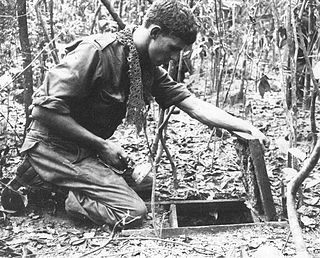
The tunnel rats were American, Australian, New Zealander, and South Vietnamese soldiers who performed underground search and destroy missions during the Vietnam War.

The tunnels of Củ Chi are an immense network of connecting tunnels located in the Củ Chi District of Ho Chi Minh City (Saigon), Vietnam, and are part of a much larger network of tunnels that underlie much of the country. The Củ Chi tunnels were the location of several military campaigns during the Vietnam War, and were the Viet Cong's base of operations for the Tết Offensive in 1968.

The Green Berets is a 1968 American war film directed by John Wayne and Ray Kellogg, and starring Wayne, David Janssen and Jim Hutton, based on the 1965 novel by Robin Moore. Much of the film was shot in the summer of 1967. Parts of the screenplay bear little relation to the novel, although the portion in which a woman seduces a North Vietnamese communist general and sets him up to be kidnapped by Americans is from the book.
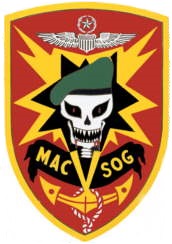
Military Assistance Command, Vietnam – Studies and Observations Group (MACV-SOG) was a highly classified, multi-service United States special operations unit which conducted covert unconventional warfare operations before and during the Vietnam War.
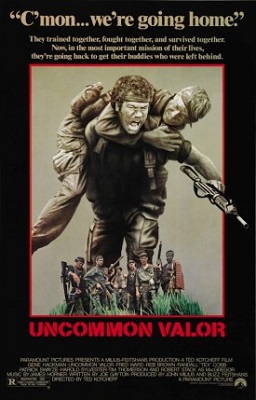
Uncommon Valor is a 1983 American action war film directed by Ted Kotcheff and starring: Gene Hackman, Fred Ward, Reb Brown, Randall "Tex" Cobb, Robert Stack, Patrick Swayze, Harold Sylvester and Tim Thomerson. Hackman plays a former U.S. Marine colonel, who puts together a rag-tag team to rescue his son, who he believes is among those still held in Laos after the Vietnam War.

Operation Crimp, also known as the Battle of the Ho Bo Woods, was a joint US-Australian military operation during the Vietnam War, which took place 20 kilometres (12 mi) north of Cu Chi in Binh Duong Province, South Vietnam. The operation targeted a key Viet Cong headquarters that was believed to be concealed underground, and involved two brigades under the command of the US 1st Infantry Division, including the 1st Battalion, Royal Australian Regiment which was attached to the US 173rd Airborne Brigade. Heavy fighting resulted in significant casualties on both sides, but the combined American and Australian force was able to uncover an extensive tunnel network covering more than 200 kilometres, at the cost of 8 Australians and 14 Americans killed and 29 Australians and 76 Americans wounded.
Tố Hữu was a Vietnamese revolutionary poet and politician. Tố Hữu is considered one of the most important Vietnamese poets of the 20th century. His poems are known for their lyrical beauty, their political engagement, and their insights into the Vietnamese people. Tố Hữu's poetry is a valuable record of the Vietnamese revolution and the Vietnamese people's struggle for independence. His poems are also a testament to the power of poetry to inspire and to give voice to the oppressed. He published seven collections of poems, the first of which was the 1946 collection entitled Từ ấy (Thenceforth), which included many of his most popular and influential works that were written between 1937 and 1946. Following the establishment of the Democratic Republic of Vietnam, he became a prominent figure in the ruling Communist Party of Vietnam.
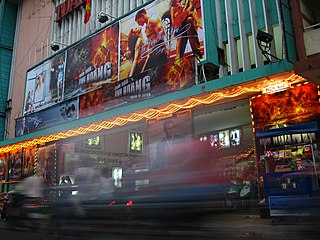
The cinema of Vietnam originates in the 1920s and was largely influenced by wars that have been fought in the country from the 1940s to the 1970s.
Tom Rhodes is an American comedian, actor, host, and travel writer.

Geoff James Nugent, known professionally as Jim Jefferies, is an Australian comedian, actor, and writer who holds dual Australian and American citizenship. He created and starred in the American FX sitcom Legit (2013–2014) and the Comedy Central late-night show The Jim Jefferies Show (2017–2019).
"In Country...Club" is the first episode of the sixth season and the seventy ninth overall episode of the animated comedy series American Dad!. It aired on Fox in the United States on September 27, 2009, and is written by Judah Miller and Murray Miller and directed by Albert Calleros and Josue Cervantes.
In the Shadow of the Blade is a 2004 American documentary film produced and directed by Patrick and Cheryl Fries. It won awards in the film industry and with the Vietnam veteran community, including the WorldFest-Houston International Film Festival "Best of Show" and "Gold Documentary" and the Vietnam Veterans of America President's Award for Outstanding Documentary. The documentary was acquired for North American television broadcast by Discovery Communications.
Traditionally, Vietnamese family has a kinship system and abided by the concepts of filial piety. However, these are often regarded as old wisdoms and traditions of Vietnamese culture rather than enacted policies.
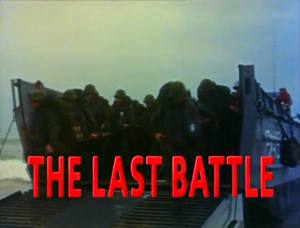
Vietnam: The Last Battle is a 1995 Carlton Television documentary, written and presented by John Pilger, and directed by David Munro, which returns to Vietnam nearly twenty years after the Vietnam War had ended to review those two decades.

Củ Chi Base Camp is a former U.S. Army and Army of the Republic of Vietnam (ARVN) base in the Củ Chi District northwest of Saigon in southern Vietnam.
In transport, tunnels can be connected together to form a tunnel network. These can be used in mining to reach ore below ground, in cities for underground rapid transit systems, in sewer systems, in warfare to avoid enemy detection or attacks, as maintenance access routes beneath sites with high ground-traffic such as airports and amusement parks, or to extend public living areas or commercial access while avoiding outdoor weather.

Waging Peace in Vietnam: U.S. Soldiers and Veterans Who Opposed the War is a non-fiction book edited by Ron Carver, David Cortright, and Barbara Doherty. It was published in September 2019 by New Village Press and is distributed by New York University Press. In March 2023 a Vietnamese language edition of the book was launched at the War Remnants Museum in Ho Chi Minh City, Vietnam.











